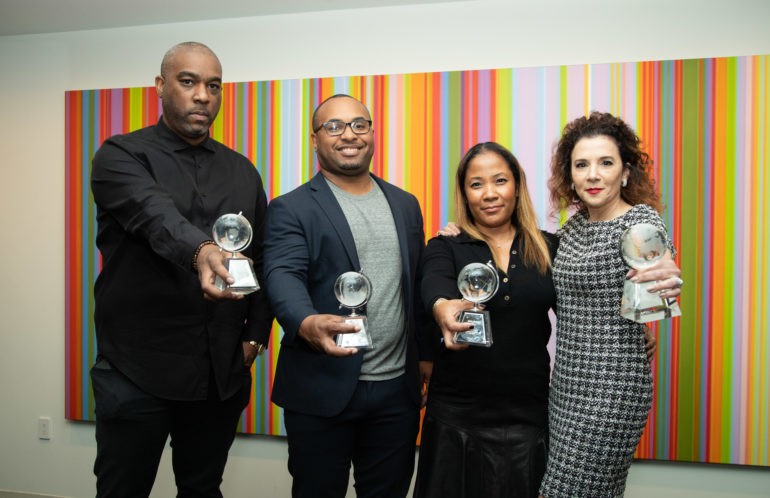Holiday Soul Party Celebrates Inclusion Progress in Film and Television
By James Patrick Herman
LOS ANGELES (Variety.com) – Merry doesn’t even begin to describe the crowd gathered at UTA on Tuesday night for the fourth annual Holiday Soul Party.
Organized by the Committee of Black Writers of the WGA, the African-American Steering Committee of the DGA and the African-American Film Critics Association, and hosted by the Ghetto Film School Roster, the networking event celebrated industry tastemakers and innovators — “people who are moving the needle in terms of diversity in Hollywood,” said producer and writer Wendy Calhoun.
Mike Jackson — John Legend’s partner in Get Lifted Film Co., who won an Emmy as executive producer of ‘Jesus Christ Superstar Live in Concert’ — was one of four celebrated agents of change for 2018.
“How do I feel that we’ve pushed the needle forward as far as ? Well, we produced ‘Jesus Christ Superstar’ and we had the first black Jesus,” Jackson told Variety. “Anything we put out there is always going to be about shining a light on our stories in an elevated way that doesn’t feel like a history lesson; it still feels entertaining. Hollywood as a whole did a fantastic job as far as diversity and inclusion.”
He continued, “There were so many things to look at that separates 2018 from many years in the past. Now what I hope we don’t do is rest on our laurels and think that we’ve arrived — because ultimately in 2019 we need to continue to transition, to build and to inspire young filmmakers.”
“Research has been the key for moving the needle forward and measuring,” noted fellow honoree Madeline Di Nonno, CEO of the Geena Davis Institute on Gender in Media. She cited statistics courtesy of the U.S. Census Bureau, for instance: “By 2020, over 50% of American children under the age of 18 will be part of a minority or ethnic group, so you have to think of that as storytellers when we talk about Gen Z and all of the generations that are coming up. We live in an intersectional world,” she added.
According the the institute’s own analysis of the top 100 American films rated G, PG and PG-13, they found that movies starring people of color with white co-leads generated 60% more at the box office than just films led by white co-stars alone.
“So it’s not about just the social imperative, which of course we care about, but it’s the business imperative. And inclusion is good for business,” Di Nonno told Variety.
“I’m proudest of the fact that we’ve distributed four films by independent filmmakers of color and women filmmakers,” said honoree Tilane Jones, VP of ’s film collective, Array Releasing. “I’m really proud of the work that Ava has done on ‘Queen Sugar’ in allowing women filmmakers to actually direct TV — that’s every season, and we’re now on season four. Hopefully that’s going to catapult their careers.”
Overall, however, Jones seemed less enthused. “Hollywood is definitely trying to put a foot forward in getting more inclusion involved in television and film and media, but we have a long way to go. It can’t be solved in one year — it may not even be solved in one decade — but I do like the climate and how things have been moving,” she told Variety.
Meanwhile, honoree Jamal Henderson has been targeting the small screen. “What we’re trying to do is tell stories that are authentic to us,” said Henderson, president of and Maverick Carter’s SpringHill Entertainment. “They are obviously big personalities — and big brands — so what we’ve done on the unscripted side with a project like ‘Shut Up and Dribble’ is to tell stories about race and basketball using an unfortunate comment by Fox News and turn it into a three-part event series on Showtime Sports.”
They are also in the process of developing Madam C.J. Walker’s story at Netflix: “It’s this epic, ‘Great Gatsby,’ turn-of-the-century, real-life ‘Hidden Figures’ story starring Octavia Spencer. The breadth of what we’re trying to build at our company is so much more than what people would expect from an athlete,” Henderson told Variety. “We’re pushing boundaries of what the town expects but also doing things that are commercially viable and have diverse protagonists and people behind the camera.”
“We’re excited about doing the work going forward — we achieved a little bit this year but there’s so much more to do,” he added, echoing the ambitions of his fellow inclusion award recipients. “LeBron is a kid from Akron who grew up in a single-parent household, so this uniquely relates to him — he didn’t see that reflected on the shows he watched.”
Jackson said earlier in the evening: “When we stop having to ask questions about what has to be done to get there — as far as telling stories of people of color — then we’ll be there. I don’t know if and when that’s going to happen, but I do know that we have a job ahead of us, as creators and producers and writers and directors and actors, to make sure that we take responsibility to keep telling our stories until that question is never asked again.”

